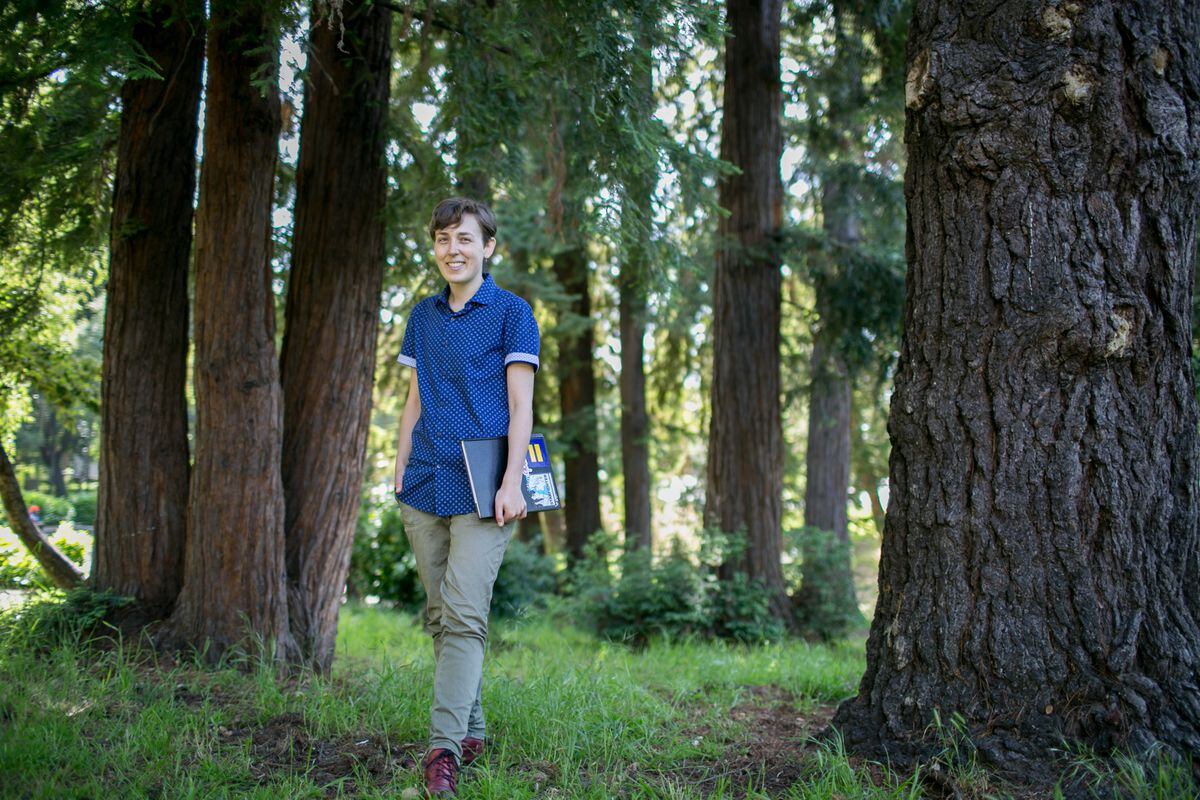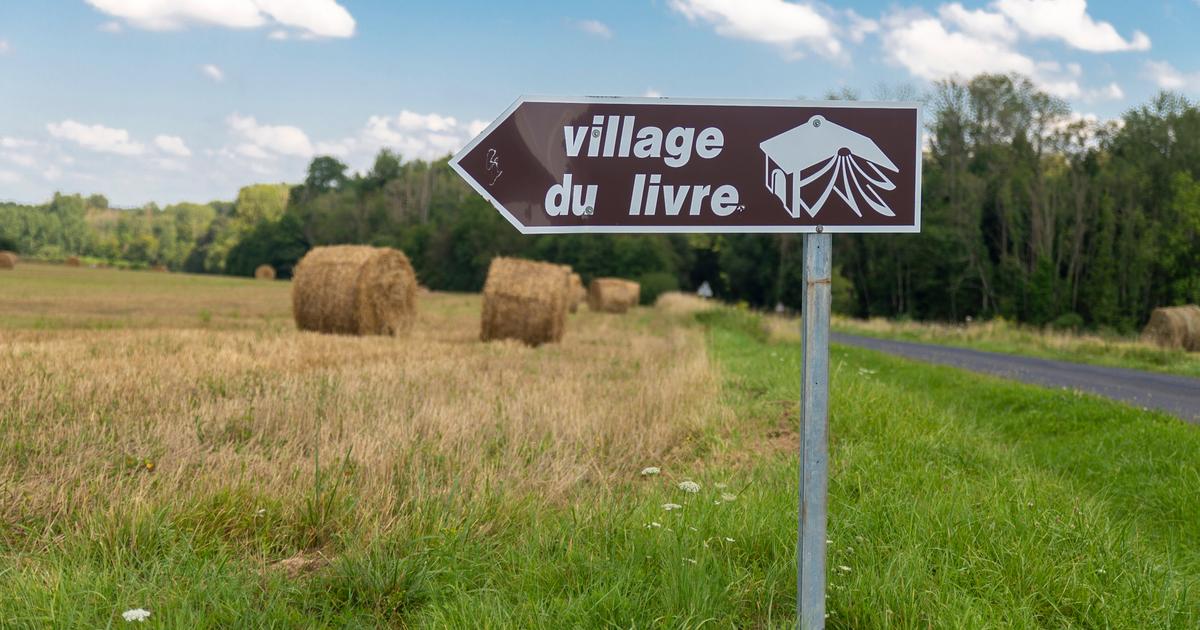Last Sunday the Week of Prohibited Books began in the United States, which every September since 1982 serves booksellers and librarians to denounce a wave of censorship that continues to grow.
Maia Kobabe celebrated by signing copies of the most persecuted title in the country, her autobiographical comic
Gender Queer
(translated into Spanish as
Gender Queer).
It was at the Small Press Expo, an independent comic book show held in a hotel outside of Washington.
The day before, he had sold out the copies he had brought to the fair that he thought would last him the weekend, so Kobabe, 33, signed at the bottom of small drawings and bookmarks for a steady stream of mostly young readers. part, that they thanked him for his “bravery”.
Some also told him how much the book had meant to them.
"This makes up for everything," he said during an interview with EL PAÍS, between signing and signing.
“It's the best thing I've gotten out of the controversy;
knowing that my effort has served many to feel more understood, to spark family conversations about gender.”
The controversy you are talking about erupted a year and a half after the publication in 2020 of a comic that tells the story of a girl born in the liberal environment of the San Francisco Bay, sheltered by understanding parents and friends, who does not feel comfortable in the seams of the gender you were "assigned at birth."
She lives tormented, she dreams of having cancer to lose sight of her breasts (later she regrets it), she has nightmares about her period, and she writes in her 15-year-old diary: “I don't want to be a girl.
I don't want to be a boy either.
I just wanna be me".
She first declares herself bisexual and finally, as asexual, non-binary gender and she stops identifying as male or female.
Its publisher marketed the comic to late teens and adults, but the award of the Alex Award from the American Booksellers Association (ALA), which honors titles "with an appealing claim for young adults, ages 12 to 18 years old”, caused many librarians and teachers across the country to start buying and recommending it for
middle school
(ages 12-14) and
high school
(ages 14-18) students.
And that's where the problems started.
"The first signs came in September 2021," recalls Kobabe, who believes that the ideal age to read
Gender Queer
is the one between the beginning of high school and the mid-twenties.
“At first there were a couple of
posts
in social networks.
I didn't pay much attention, until they started censoring it in Virginia, Texas, Florida, Pennsylvania, Rhode Island, Alaska... And I've already lost count.
Every day I think that the thing is about to happen, but there is no way to lower the news of today.
Self-portrait of Maia Kobabe.
Today,
Gender Queer,
which began with a modest print run of 5,000 copies that few expected to sell out and is now in its six editions, is banned in 41 school districts in at least 11 states, at the request of parents, alone or formed in associations such as Moms for Liberty (Mothers for freedom), who denounce that in it there are sex scenes, masturbations, a dildo and fellatio, images spread over a handful of vignettes of a clear-line comic about an exploration, between adolescence and maturity of sexuality and identity.
For Pamela Macek, who questioned
Gender Queer
in a county in Democratic New Jersey, those books should be in a section only accessible to children with parental supervision: "What [Kobabe] does in bed is none of my business, nor is it my children's," he says.
This is a constant in the penultimate crusades against books in the United States: instead of attacking the subject they deal with (the main targets are racial conflicts, homosexuality or, as in this case, gender self-determination), the detractors seek objective reasons.
Such was the recent case of
Maus
, a graphic novel about the Holocaust by Art Spiegelman, the son of an Auschwitz survivor, which was removed from the eighth grade (13-year-old) curriculum by order of a Tennessee county school board.
The reason?
It contained a nude "and eight swear words."
“They seem like excuses to me,” Kobabe considers.
“The nudity, the profanity
,
same-sex kisses… are things they don't care about when they see them in the thousands of movies, TV shows, or books that aren't starring
queer,
trans, or people of color.
It seems extremely hypocritical to me.
It's all part of a plan to silence us and marginalize us from public life."
Cartoons from the Spanish edition of 'Gender Queer', translated as 'Género queer'.
Maus
is a regular on banned book lists that
Gender Queer lately tops.
This week PEN America, a century-old organization that works at the intersection between literature and civil rights, has published another list in which Kobabe's comic repeats at the top.
The report denounces that, so far this year, 1,648 titles have been banned in the United States, of which 41% touched on themes or had LGTBI characters and 40% dealt with racial issues or had protagonists of color.
According to the ALA, last year that figure rose to 1,597, the highest since they began keeping track in 1990.
The increase has to do both with the extreme political polarization and with the pandemic, during which many parents were able to accompany their children in their studies, prisoners in the family home, and saw things in educational programs that they did not like.
One of the slogans of Moms for Liberty reads: "We will not co-parent with the Government!"
"During the 2021-22 school year," warns the PEN report, "what began as a modest activity to question and remove books from schools became a full-fledged social and political movement, driven by local, state and nationals”.
On the latter list, No. 2 goes to
All Boys Aren't Blue
,
a
YA book about the formative experience of its author, George M. Johnson, as a gay black boy.
The third is
Out of Darkness
,
a
historical novel by Ashley Hope Pérez about the love between a Latina and an African-American in Texas in the 1930s, targeted for containing a certain anal sex scene.
And in the room,
Blue Eyes,
Nobel Toni Morrison's debut, tells the harsh story of a black girl self-conscious about her ugliness who dreams of having white features and is raped by her father, who leaves her pregnant.
Morrison is not the only inhabitant of literary Olympus on these lists:
Harper Lee's
To Kill a Mockingbird has also been questioned;
Of Mice and Men,
by John Steinbeck, or
Huckleberry Finn,
by Mark Twain, for their “racism”.
In those cases, the questions came from the other side of the ideological spectrum, in Democratic states like California.
Toni Morrison, at an event held in New York in 1994, the year after winning the Nobel Prize for Literature. Kathy Willens (AP)
It should also be noted that there is some license in the term "prohibited".
It is not that its sale is prevented;
rather, books are removed from educational programs, they are thrown away on the shelves and are not lent, which makes them invisible (which is just the opposite of what bookstores and libraries have done this week, in which they are dedicated to promote those titles, display them prominently in shop windows, and hold talks about them).
But with
Gender Queer
, the thing was about to go to great lengths, when two Republican politicians asked a Virginia court to declare it obscene and inappropriate for minors;
they wanted to prohibit booksellers from selling it without parental consent.
A judge dismissed the lawsuit.
“I was so relieved to hear the news.
But my lawyers were convinced from the beginning that we would win the case," says Kobabe, who, a few days after the interview, sent EL PAÍS a statement by email: "I understand that you already know it, but in English I use the non-binary pronouns
'e, em, eir'
[instead of the feminine ones,
'she, her, her
', or the masculine ones,
'he, his, him'
].
And in Spanish, I use '
elle
' and
'e'
for word endings:
elle está cansade
[in Spanish in the original]”.
When asked if he is tired of fighting for others to abide by his decision, he replied: “There is everything!
My family, friends, and co-workers have mastered it already, having been using them for over five years.
Strangers often have a hard time.
In the media?
Depends.
Time
magazine
used non-binary pronouns in a recent interview [and was mocked on social media for it], while
The New York Times
mentioned them without actually using them."
TIME spoke to "Gender Queer" author and illustrator Maia Kobabe on about eir work, the efforts to restrict access to eir writing, and what they make of the current cultural moment https://t.co/JLdmgu5lCL
– TIME (@TIME) September 1, 2022
In Spanish, the problems come for those who sympathize with Kobabe's cause and with the rules of Spanish
Grammar
(or, as in the case of this article, of the EL PAÍS
Style Book
), not so much with pronouns. possessives, which lack gender in our language, as with personal pronouns and nouns, which, instead, are common in English in terms of gender.
Cristian Escudero, editor of Astronave, Norma Editorial's youth imprint, which has
Gender Queer , knows this well.
in its catalog for readers from 14 years old since 2020, before the controversy.
The translation, by Alba Pagán, uses non-binary language moderately.
Escudero tells in a telephone conversation from Barcelona that the book has enjoyed a “good reception”, and that they have just reprinted it and are studying publishing it in Catalan.
Astronave, he adds, “is not a publisher specializing in LGTBI issues”, but one of its lines consists of publishing “stories of representation”.
And among them, he cites
Cheerleaders
.
Pride and
Pompoms,
which tells a love story between two girls, one of them in transition, and
A-Okay.
Everything will be fine,
whose protagonist is asexual.
For his second book, Kobabe plans to continue exploring that path.
She will do so in response to requests from parents of children outside of traditional gender roles, who have asked for a version for younger readers.
It will also be a graphic novel.
“Luckily”, she acknowledges, “I already had 90% written when everything blew up, so the result will not be influenced by all this noise”.
Subscribe to continue reading
read without limits
Keep reading
I'm already a subscriber



/cloudfront-eu-central-1.images.arcpublishing.com/prisa/DNRYCWU6TFHD5AKHCDDWYTYIRY.jpg)

/cloudfront-eu-central-1.images.arcpublishing.com/prisa/NE3WNQBZWRB2ZBLDPQUTG6UTYQ.jpg)









/cloudfront-eu-central-1.images.arcpublishing.com/prisa/IGZ7GOCXZ5GUPAQ2HWGK6Z76BU.jpg)